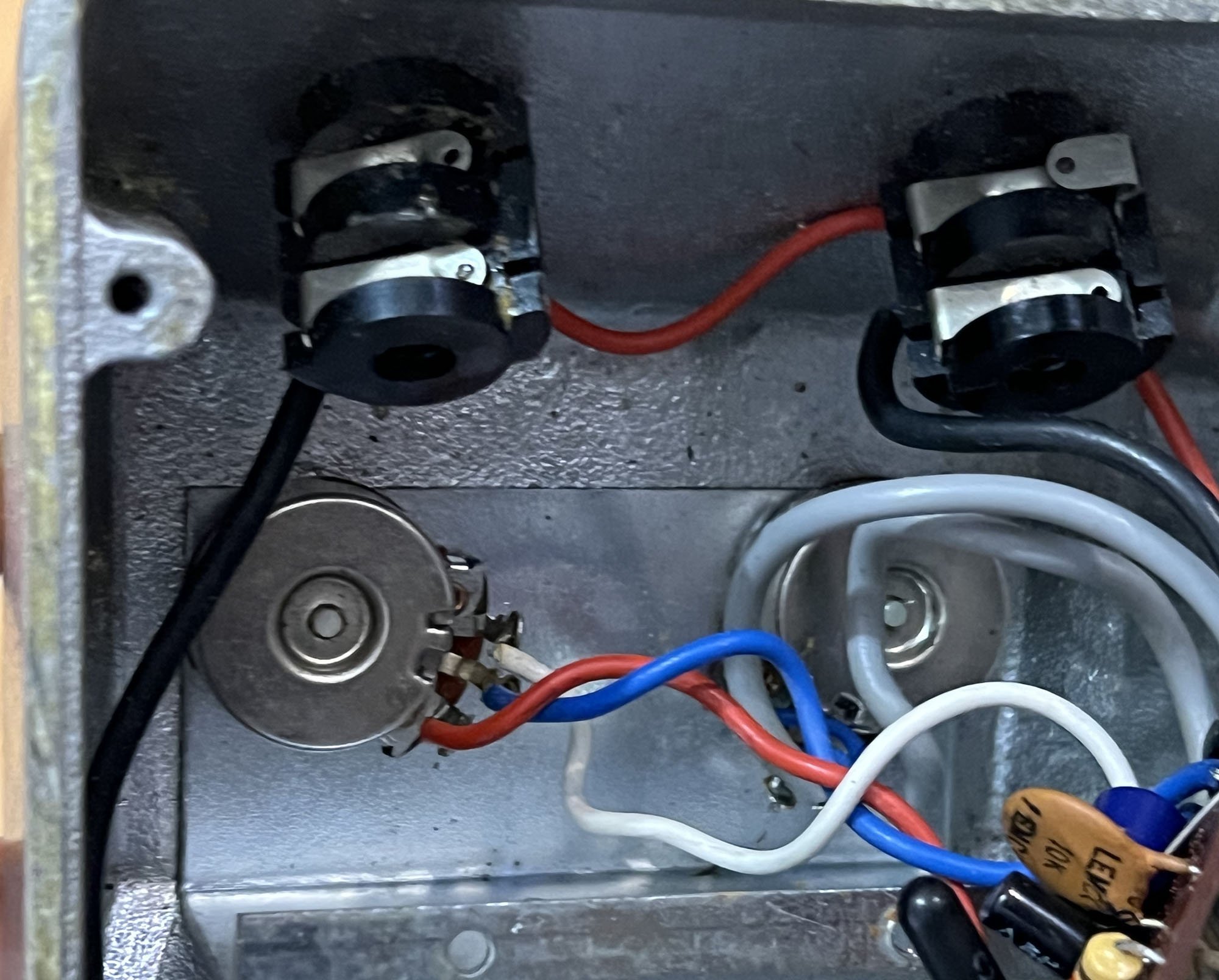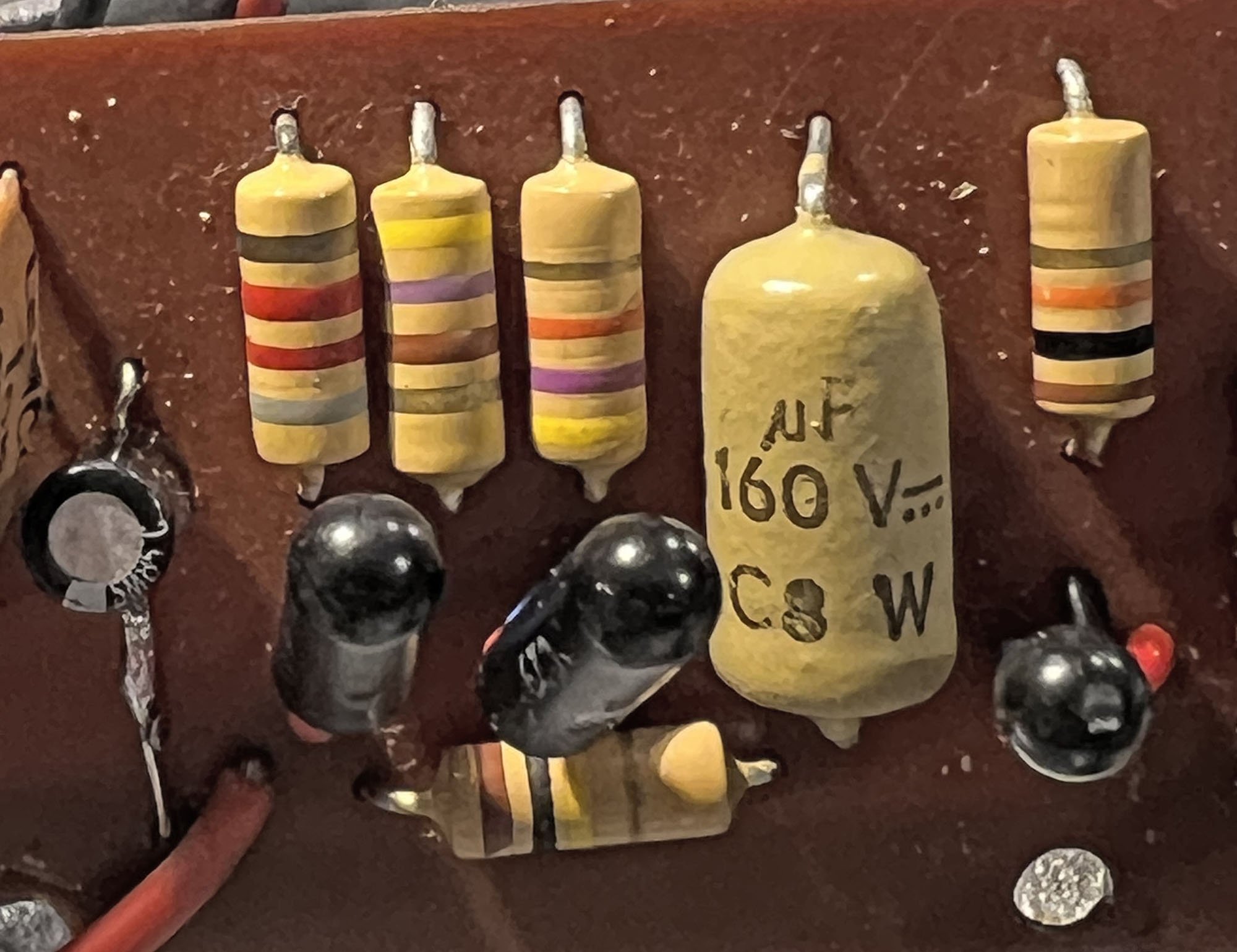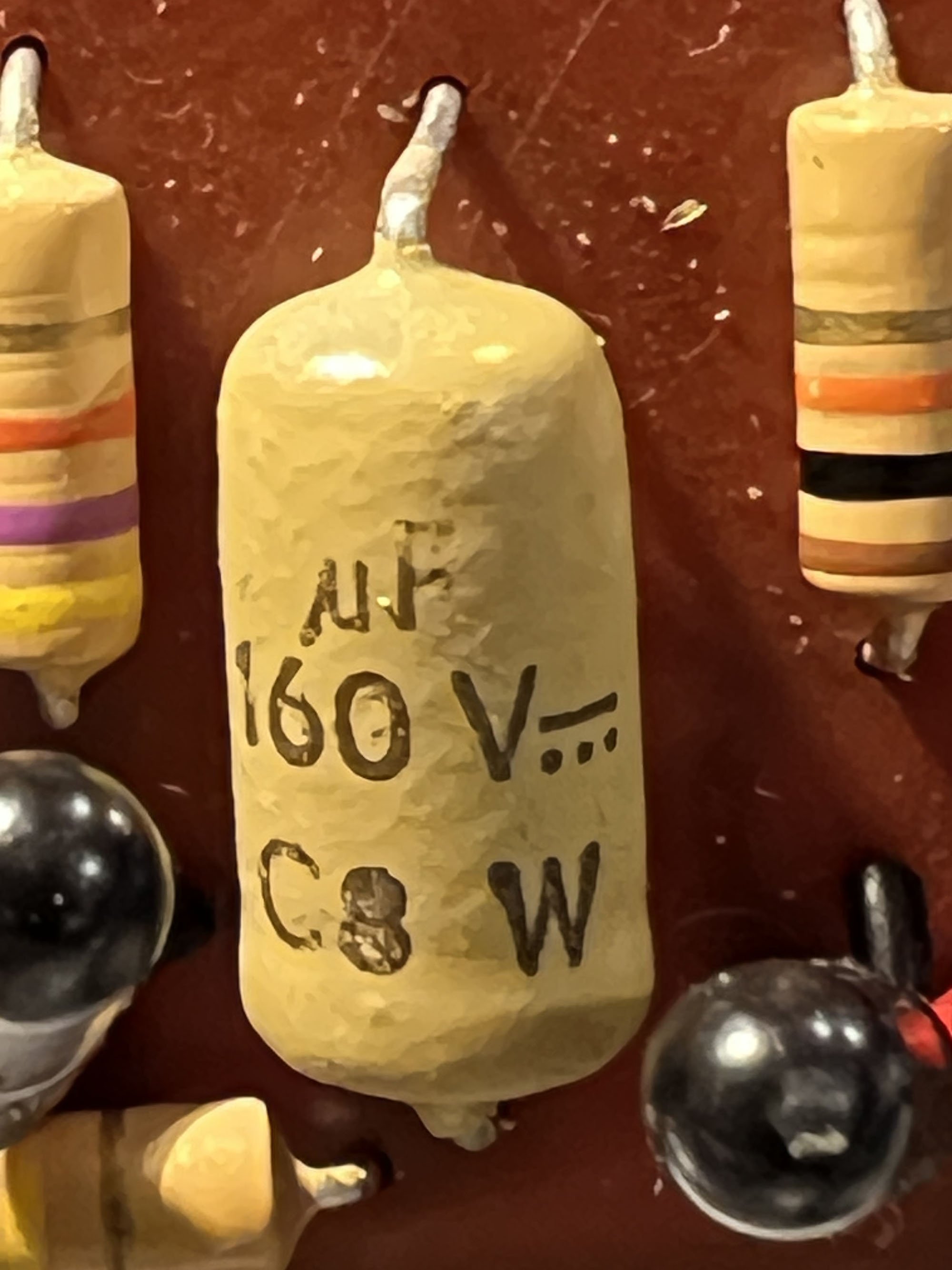 Image 1 of 13
Image 1 of 13

 Image 2 of 13
Image 2 of 13

 Image 3 of 13
Image 3 of 13

 Image 4 of 13
Image 4 of 13

 Image 5 of 13
Image 5 of 13

 Image 6 of 13
Image 6 of 13

 Image 7 of 13
Image 7 of 13

 Image 8 of 13
Image 8 of 13

 Image 9 of 13
Image 9 of 13

 Image 10 of 13
Image 10 of 13

 Image 11 of 13
Image 11 of 13

 Image 12 of 13
Image 12 of 13

 Image 13 of 13
Image 13 of 13














Original Marshall Supa Fuzz (Tonebender Mk II)
This is an original 1969 Marshall Supa Fuzz pedal, in great cosmetic condition, just serviced and working perfectly.
Cosmetically, it’s in excellent condition for its age - one of the feet is a replacement and it is missing the gold tops to the two knobs but this is an original late 1960s effect in great working order. Component date codes fix this as a 1969 example (one code is third quarter of 1968, one is week 10 of 1969). Early ‘70s ones seem to have raised lettering on the case rather than the simple black lettering on this one.
Electronically, the pots, switches, cliff jacks and (crucially) germanium transistors all look original. Three electrolytic capacitors have been replaced. This had already been done when the Amporium’s gnomes got hold of this pedal, but the original three components are still with the pedal and could easily be refitted for 100% originality. The Eerie 50uF 50v capacitor (the blue one in the photos) tests fine (60uF and around 1 ohm esr if you’re interested ..) but shows signs of leaking around one end so we’ve chosen not to re-install it. Instead, we replaced the existing modern replacement to the exact vintage-correct value and used a top quality Sprague Atom.
The Supa Fuzz was Marshall’s version (copy, really) of the classic Tonebender Mk II pedal. The circuit is identical (topologically) to the TB Mk II with some minor differences in the values of components. For those who know more than I do about these pedals, I believe the differences are as follows:
The Germanium transistors are OC75’s. ToneBender Mk2’s were OC81D (but they were also made with OC75’s at various times)
The input coupling cap and the emitter bypass capacitor are both slightly larger (10uF rather than the 5uF on the Tonebender Mk II) and two of the resistors have slightly higher values.
This sounds glorious. Certainly not subtle, but loud, lary (and hugely enjoyable) early fuzz!
Drop me a line if you’re interested (the contacts page is working now) and feel free to come and try this with one of your, or our, amplifiers.
This is an original 1969 Marshall Supa Fuzz pedal, in great cosmetic condition, just serviced and working perfectly.
Cosmetically, it’s in excellent condition for its age - one of the feet is a replacement and it is missing the gold tops to the two knobs but this is an original late 1960s effect in great working order. Component date codes fix this as a 1969 example (one code is third quarter of 1968, one is week 10 of 1969). Early ‘70s ones seem to have raised lettering on the case rather than the simple black lettering on this one.
Electronically, the pots, switches, cliff jacks and (crucially) germanium transistors all look original. Three electrolytic capacitors have been replaced. This had already been done when the Amporium’s gnomes got hold of this pedal, but the original three components are still with the pedal and could easily be refitted for 100% originality. The Eerie 50uF 50v capacitor (the blue one in the photos) tests fine (60uF and around 1 ohm esr if you’re interested ..) but shows signs of leaking around one end so we’ve chosen not to re-install it. Instead, we replaced the existing modern replacement to the exact vintage-correct value and used a top quality Sprague Atom.
The Supa Fuzz was Marshall’s version (copy, really) of the classic Tonebender Mk II pedal. The circuit is identical (topologically) to the TB Mk II with some minor differences in the values of components. For those who know more than I do about these pedals, I believe the differences are as follows:
The Germanium transistors are OC75’s. ToneBender Mk2’s were OC81D (but they were also made with OC75’s at various times)
The input coupling cap and the emitter bypass capacitor are both slightly larger (10uF rather than the 5uF on the Tonebender Mk II) and two of the resistors have slightly higher values.
This sounds glorious. Certainly not subtle, but loud, lary (and hugely enjoyable) early fuzz!
Drop me a line if you’re interested (the contacts page is working now) and feel free to come and try this with one of your, or our, amplifiers.
This is an original 1969 Marshall Supa Fuzz pedal, in great cosmetic condition, just serviced and working perfectly.
Cosmetically, it’s in excellent condition for its age - one of the feet is a replacement and it is missing the gold tops to the two knobs but this is an original late 1960s effect in great working order. Component date codes fix this as a 1969 example (one code is third quarter of 1968, one is week 10 of 1969). Early ‘70s ones seem to have raised lettering on the case rather than the simple black lettering on this one.
Electronically, the pots, switches, cliff jacks and (crucially) germanium transistors all look original. Three electrolytic capacitors have been replaced. This had already been done when the Amporium’s gnomes got hold of this pedal, but the original three components are still with the pedal and could easily be refitted for 100% originality. The Eerie 50uF 50v capacitor (the blue one in the photos) tests fine (60uF and around 1 ohm esr if you’re interested ..) but shows signs of leaking around one end so we’ve chosen not to re-install it. Instead, we replaced the existing modern replacement to the exact vintage-correct value and used a top quality Sprague Atom.
The Supa Fuzz was Marshall’s version (copy, really) of the classic Tonebender Mk II pedal. The circuit is identical (topologically) to the TB Mk II with some minor differences in the values of components. For those who know more than I do about these pedals, I believe the differences are as follows:
The Germanium transistors are OC75’s. ToneBender Mk2’s were OC81D (but they were also made with OC75’s at various times)
The input coupling cap and the emitter bypass capacitor are both slightly larger (10uF rather than the 5uF on the Tonebender Mk II) and two of the resistors have slightly higher values.
This sounds glorious. Certainly not subtle, but loud, lary (and hugely enjoyable) early fuzz!
Drop me a line if you’re interested (the contacts page is working now) and feel free to come and try this with one of your, or our, amplifiers.
